Note: This publication is currently undergoing major revisions. The current publication will be replaced with a new publication based on stakeholder requirements and scientific advances. We expect to begin sharing details on this soon. If you have input on content, format, or publication frequency at any time, please contact us at cbrfc.webmasters@noaa.gov.Green Water Supply Outlook, March 1, 2010Green Water Supply Outlook, March 1, 2010
Contents
Green Summary
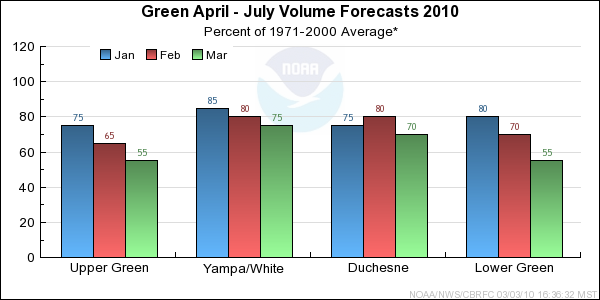
*Median of forecasts within each basin.
Upper Green Basin Conditions
The following conditions influenced this month's forecasts:
Precipitation:
Seasonal October through February
precipitation was 65 percent of average
in the Upper Green basin. February
precipitation was 45 percent of average.
Snow:
March 1st snow water equivalent was near 60 percent of average in the basin
as a whole.
--- Upper Green basin
snow
water equivalent plot.
Streamflow:
February streamflow was near 80 percent of average.
Soil Moisture:
Modeled
soil
moisture states ranged from below average to near average heading into the winter.
Climate Forecasts:
Climate forecasts were not a factor because there is not a strong correlation
between El Nino conditions and winter precipitation in the Upper Green basin.
Forecast Summary:
Due to much below average seasonal precipitation to date and much below average
March 1st snow water equivalent values the April through July streamflow
volume forecasts are much below average at this time. These
forecasts have dropped
and now range between 43 and 66 percent of average, with a median value of 55 percent.
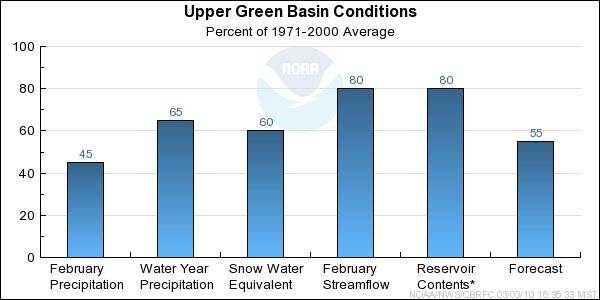
* Percent usable capacity, not percent average contents.
Click for multi-month Graph.
Yampa/White Basin Conditions
The following conditions influenced this month's forecasts:
Precipitation:
Seasonal October through February
precipitation was 85 percent of average
in the Yampa/White basin. February
precipitation was 80 percent of average.
Snow:
March 1st snow water equivalent was 75 percent of average in the basin
as a whole.
--- Yampa basin
snow
water equivalent plot.
Streamflow:
February streamflow was near 70 percent of average.
Soil Moisture:
Modeled
soil
moisture states were near average heading into the winter for the Little Snake
and White River basins. Modeled states ranged from below average to near average
heading into winter for the Yampa basin.
Climate Forecasts:
Climate forecasts were not a factor because there is not a strong correlation
between El Nino conditions and winter precipitation in the Yampa/White basin.
Forecast Summary:
Due to below average seasonal precipitation to date and below average
March 1st snow water equivalent values the April through July streamflow
volume forecasts are below average at this time. These
forecasts have dropped
slightly and now range between 57 and 80 percent of average, with a median value
of 75 percent.
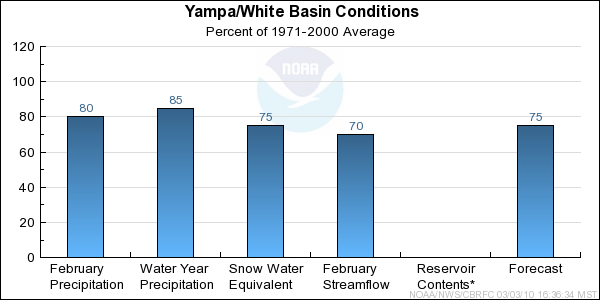
* Percent usable capacity, not percent average contents.
Click for multi-month Graph.
Duchesne Basin Conditions
The following conditions influenced this month's forecasts:
Precipitation:
Seasonal October through February
precipitation was 70 percent of average
in the Duchesne basin. February
precipitation was 40 percent of average.
Snow:
March 1st snow water equivalent was 70 percent of average in the basin
as a whole.
--- Duchesne basin
snow
water equivalent plot.
Streamflow:
February streamflow was 90 percent of average.
Soil Moisture:
Modeled
soil
moisture states were much below average to below average heading into the winter.
Climate Forecasts:
Climate forecasts were not a factor because there is not a strong correlation
between El Nino conditions and winter precipitation in the Duchesne basin.
Forecast Summary:
Due to below average seasonal precipitation to date and below average
March 1st snow water equivalent values the April through July streamflow
volume forecasts are below average at this time. These
forecasts have dropped
and now range between 51 and 81 percent of average, with a median value of 70 percent.
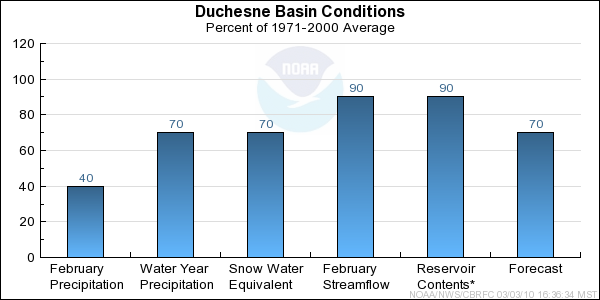
* Percent usable capacity, not percent average contents.
Click for multi-month Graph.
Lower Green Basin Conditions
The following conditions influenced this month's forecasts:
Precipitation:
Seasonal October through February
precipitation was 80 percent of average
in the headwaters of the Lower Green basin. February
precipitation was 95 percent of average.
Snow:
March 1st snow water equivalent was 70 percent of average in the basin
as a whole. However, the Price and San Rafael headwaters did not receive as much snow as those further to the south.
--- Price basin
snow
water equivalent plot.
Streamflow:
February streamflow was near 75 percent of average.
Soil Moisture:
Modeled
soil
moisture states were much below average heading into the winter.
Climate Forecasts:
Climate forecasts were not a factor because there is not a strong correlation
between El Nino conditions and winter precipitation in the Lower Green basin.
Forecast Summary:
Due to below average seasonal precipitation to date, the below average
March 1st snow water equivalent values, and the much below average soil moisture heading into winter
the April through July streamflow volume forecasts are much below average at this time.
These
forecasts have dropped
and now range between 49 and 64 percent of average, with a median value of 55 percent.
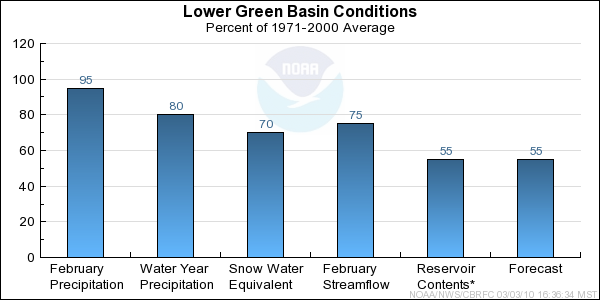
* Percent usable capacity, not percent average contents.
Click for multi-month Graph.
Differences between the full period forecasts and the residual forecasts may not exactly equal the actual observed volumes due to rounding conventions (see Definitions section).
Reservoir Monthly Inflow Forecasts
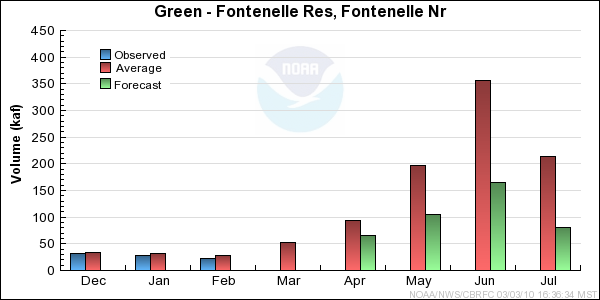
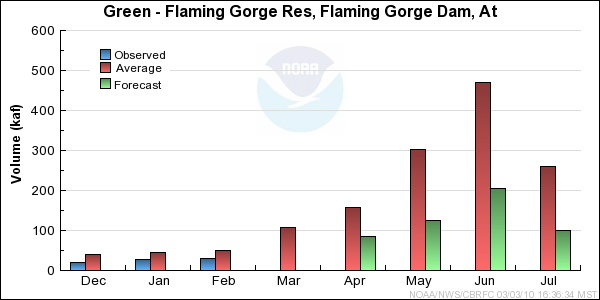
Monthly Streamflows
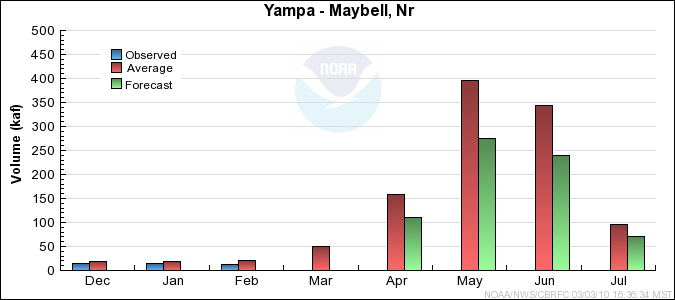
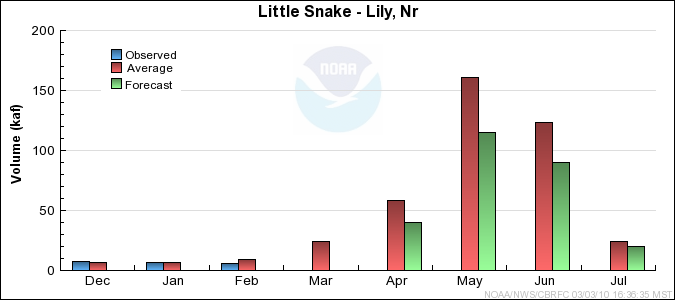
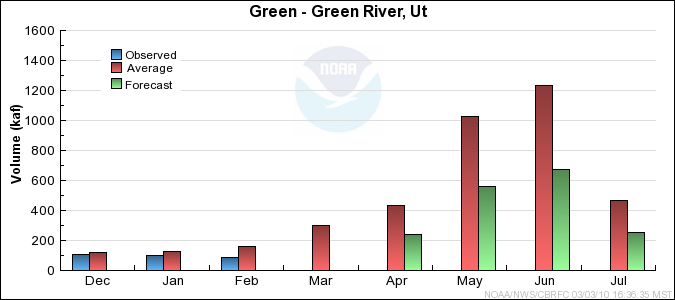
Precipitation Maps
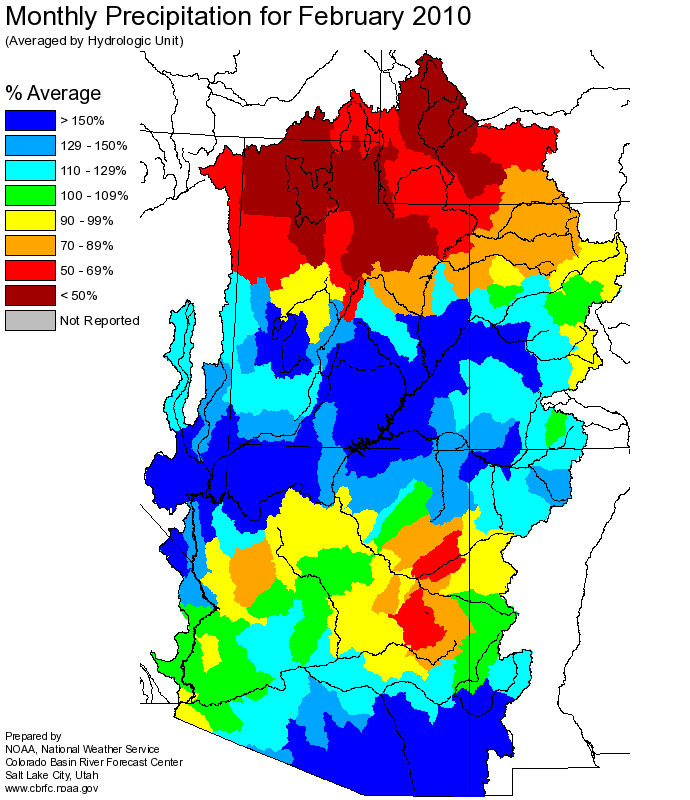
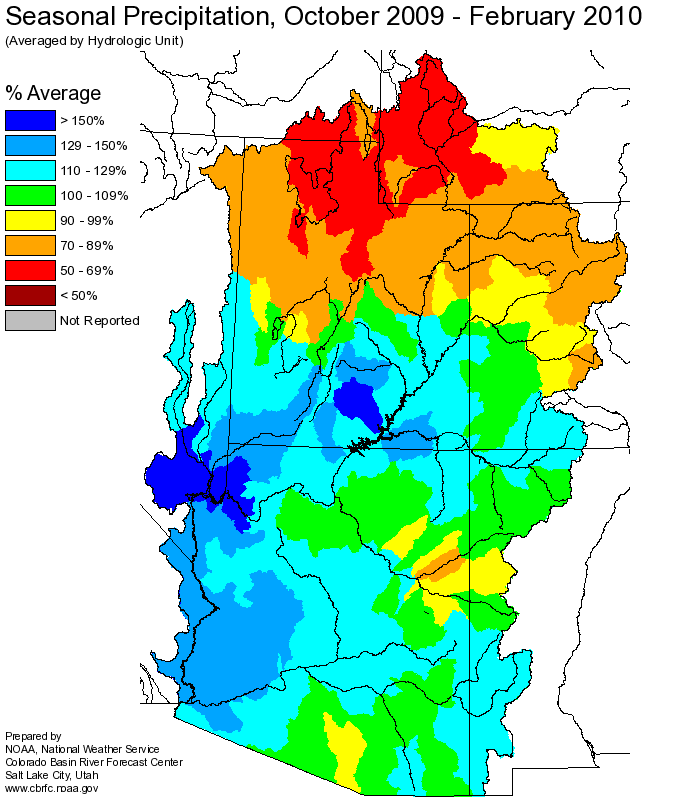
Hydrologist: William Reed













